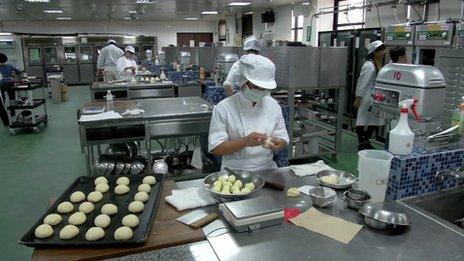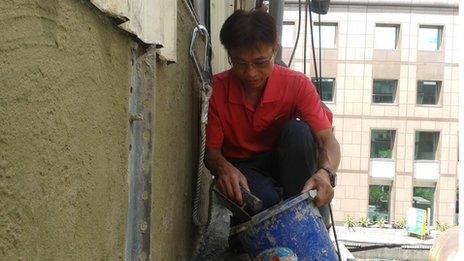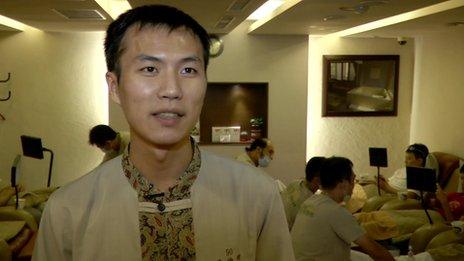The draw of blue collar jobs in Taiwan
- Published
Taiwan is seeing an increasing number of white collar workers switching to blue collar jobs, as Cindy Sui reports.
For many Asians, the definition of success is getting a college degree and a white collar job, preferably as a doctor, lawyer or engineer.
But in Taiwan, an increasing number of people are switching from white collar to blue collar work, partly because degree holders cannot earn the kind of salary they want.
Many are ditching the office life altogether, turning the traditional Asian concept of modern-day success upside down.
Although the government's Council of Labor Affairs does not keep statistics on the number of white-collar workers or degree holders opting for blue collar jobs, vocational training centres in Taiwan say they have seen an increase in people with higher education backgrounds - even PhD holders - in recent years.
'Live happily'
"We're seeing this trend now perhaps because there are too many college degree holders for the job market. But also people no longer place so much importance on diplomas," said Florence Kao, director of the Taipei Vocational Development Institute.
"They think if they have a vocational skill, they can also live happily."

Baking and cooking are some of the more popular skills for white collar workers
More than 77% of office workers who filled out a recent online questionnaire by yes123, a local job bank, said they would be willing to switch to certain blue collar work. The main reason: low wages and difficulty in finding well-paying white collar jobs.
The average salary for someone fresh out of college is only about $850 (£529) a month, the same as for many entry-level blue collar jobs, Ms Kao said. But whereas office workers' pay will increase to at most $1,000 after two years, some blue collar workers, especially plumbers and electricians, can earn as much as $2,000.
After factoring in inflation, Taiwan's real wages were lower than the level they were at 16 years ago. That is especially disappointing to people who spent money and time to get a higher education. And many white collar workers are not paid by the hour; they have to get their work done no matter how long it takes, with no overtime pay.
These factors are leading more young people to ignore their parents' hopes for them to have a cushy desk job in an air conditioned office, and re-evaluate what career happiness means.
Local media have recently reported about people with high education doing manual labour, including a PhD holder who sold fried chicken for a living. And there is a wave of young Taiwanese going to Australia to earn high wages in orchards or sheep farms. Others scrape together savings or loans from their parents to open beachside eateries - opting for surfer trunks instead of a suit and tie.
High hopes
Wearing gloves covered with motor grease, Sam Wei, 28, is hardly the picture of the person he was a year ago. He quit his job as an engineer at a high-tech firm this year to work at his father's scooter repair shop. He does not regret his decision, even though he has a masters degree in engineering.
"I had a lot of hopes when I entered the work force after college; I wanted to learn a lot, but the hours were long and the wages were low compared to what I was putting into the job," Mr Wei said.
"That's when I decided to quit the high tech job and come back to my dad's motorbike repair shop to work. And my dad was getting near retirement age at the time."

Mr Chen used to have a staff of 40 under him when he worked in IT
Convincing his father was not difficult, but his mother strongly objected. "My mother thought it was a big waste because I had a master degree," Mr Wei said.
His college friends were also shocked.
"Most people think this type of work is dirty, and is done by people who don't study. But I think that's not true, it requires a lot of skills, and I'm learning a lot," said Mr Wei, who plans to take over his dad's business.
Nicky Chen, 50, used to head a county IT department, with 40 people working under him. He is now a plumber and electrician, earning a third of his former salary.
When the county changed magistrates, he found himself unemployed and unable to find a job in his field because of his age. With no luck starting businesses either, he decided to learn a trade.
Without prior experience, Mr Chen earned three certificates in four months for electrical, plumbing and gas repair work. That includes fixing toilets.
"I was ashamed to let friends and relatives know at first. Before I would be the one to tell other people what to do; now I have to do it myself and handle only one small task at a time," Mr Chen said.
"I thought I've accomplished so much, received so many awards, and have such high education, why am I doing this kind of work?
"Now I think it's a good job, why can't I do it just because I have a master degree? I feel a sense of satisfaction helping people do these repairs. They're happy, I'm happy, and that's enough for me," he said.
Stress release
Baking and cooking are some of the more popular skills for white collar workers. There is also telecommunications repair - something Ms Kao says is a natural transition given their familiarity with computers and office equipment.
But many students are not just motivated by money.
"Some people have idealistic goals when they come here. They want to learn to make cookies and open a bake shop. We help them understand the realities of the work and the market," said Ms Kao.

Mr Tsai says he now enjoys going to work as a masseur
The government has been roundly criticised for not doing enough to lift the economy and provide good jobs, especially for college graduates, but Ms Kao considers the trend of people exploring blue collar work good.
"Chinese people's view is studying is more important, but if we think about it, the things we need every day are done by blue collar workers - when you go to work, the street you walk on, the vehicle you ride in, that's all provided by blue collar workers, so gradually people's views are changing, we're starting to see more parents willing to let their kids learn a [vocational] skill," said Ms Kao.
Tim Tsai, 29, used to wear a suit to work every day, as an investment adviser at a bank. Now he wears a masseur's uniform. He enjoys helping relieve people of their stress - much more meaningful, he says, than trying to convince bank customers to invest in an uncertain global economy so he could earn commission and make the bank happy.
He makes the same amount he used to, but works longer hours. Despite this, and initially strong objections from his parents, he believes he made the right decision.
"I didn't feel passionate about my last job. I was always thinking about quitting," Mr Tsai said. "Since I began massaging people, I find this is quite a skilled profession, it can help a lot of people, even with treating some diseases."
His parents, girlfriend and friends are now happy that he has found a job he likes.
"Through this experience I think what's most important is doing something that interests you and that you're passionate about," said Mr Tsai. "That way you won't feel tired and when you wake up each day and think about going to work, you're happy."
Unless Taiwan's environment for white collar workers improves, more people may follow Mr Tsai's footsteps and look for other options, even in unlikely professions.